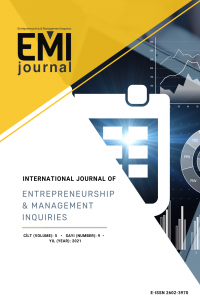Abstract
İnsan yaşam döngüsünde gençlik, birçok heyecanın ve duygunun karmaşık şekilde yaşandığı bir dönemdir. Gençlerin gelecek beklentileri ve bu beklentilere yönelik duygu durumları bazen kaygı ve endişelere neden olabilmektedir.
Dünya genç nüfus oranı (2019) %16 iken Türkiye’de bu oran %15.6’dır. Z jenerasyonu olarak adlandırılan bu genç kuşak 1997-2012 tarihleri arasında doğmuş kişileri kapsamaktadır. Geleceğin parlak inşasında Z jenerasyonu önemli roller üstlenecektir. Türkiye’de 7 milyon 940 binden fazla üniversite öğrencisi, 11 milyonun üzerinde ilk öğretim ve lise öğrencisi bulunmaktadır. Z jenerasyonu internetin olduğu bir dünya doğan jenerasyondur. Bilgiye erişimleri kolay ve hızlı olmasından dolayı çabuk sıkılmaktadır ve geleneksellikten uzak bir hayatı tercih etmektedir. Fakat z jenerasyonunun meslek tercilerinde x ve y jenerasyonu (aile, öğretmenler, akrabalar vb.) etkili olmaktadır. Türkiye’de 11 milyonu aşkın X ve Y kuşağı (yönetici ve çalışan) olduğu çalışma hayatına yakın gelecekte 13 milyonu aşkın Z jenerasyonu katılacaktır. Gençler tarafından mevcut istihdam olanaklarının yeterli olmağı, Z jenerasyonunun bilgi ve deneyimlerinin geleneksel işlerde kullanılmak için uygun olmadığı gibi yaygın bir görüş vardır. Bu nedenle üniversite eğitimi almış z jenerasyonun mezuniyet sonrasında işsizlik kaygısı giderek artmaktadır. Olası işsizlik nedeniyle hayata başlayamama, aile yanında kalma vb. kaygılar yaşanmaktadır.
Bu çalışmanın amacı; Z Kuşağı’nın gelecek beklentileri, işsizliğin gençler üzerinde yarattığı baskının ölçülmesidir. Araştırmaya özel olarak hazırlanan ölçek çevrim içi platformlardan yayınlanmıştır. Araştırma Covid-19 sürecinde 2021 yılında Türkiye’de yapılmıştır. Araştırma farklı üniversitelerden üniversite öğrencisi ve işsiz mezunlar ile yapılmıştır. Araştırmanın literatür bölümü Stratejik İnsan Kaynakları Yönetimi kapsamında değerlendirilmiştir. Araştırmanın sonuç bölümünde, yapılan anketin sonuçları tartışılmıştır.
Supporting Institution
Eskişehir Teknik Üniversitesi
References
- Aeppel, T. (2020, March). 50 Million Users: The Making of an ‘Angry Birds’ Internet Meme. The Wall Street Journal. Retrieved from h ttp://blogs. wsj. com/economics/2015/03/20/50-million-users-the-makingof-an-angry-birds-internet-meme/>.
- Angeli, L., Stoycheva, M., Fiore, F., & Montresor, A. (2019). a Conceptual Exploration in the Intersection of. Proceedings of Edulearn19 Conference, (pp. 7374-7378). Palma de Mallorca.
- Ayhan, F. (2016). ’Genç İşsizliğin Sebepleri, Sonuçları ve Önlemeye İlişkin Politika Önerileri. Sosyal Güvenlik Dünyası, 8-21.
- Bekiroğlu, C. (2010, Haziran). Türkiye’de İşsizlik Sorununun Çözümlenmesinde Uygulanan Ekonomi Politikalarının Analizi. İstanbul: Kadir Has Üniversitesi Sosyal Bilimler Ensititüsü Yayınlanmamış Tez.
- Çetinkaya, E. (2010). Genç Işsizliğin Teorik Açıklamalari, Journal of Social Policy Conferences (pp. 46-57). Sakarya: Sakarya Üniversitesi.
- Çondur, F., & Şimşir, N. C. (2017). An Analysis of The Relationship Between Educational Expenditures, Economic Growth and Youth Unemployment in Turkey. The Journal of International Scientific Researches, 2(6), 44-59. doi:https://doi.org/10.23834/isrjournal.306855
- Erdoğan, E. (2016). Türkiye'de Gençlerin İyi Olma Hali Saha Araştırması Bulguları. habitatdernegi.org.
- Giunta, C. (2020). Digital Marketing Platform Tools, Generation Z, and Cultural Considerations. Journal of Marketing Development and Competitiveness, 14(2), 63-75.
- Greigg, S., & Kyllonen, P. (2016). Contemporary Assessment Challenges: The Measurement of 21st Century Skills. 21st Century Skill Assessment, 29(4), 243-244. doi:https://doi.org/10.1080/08957347.2016.1209209
- Gu, J., & Belland, B. R. (2015). Preparing Students with 21st Century Skills: Integrating Scientific Knowledge, Skills, and Epistemic Beliefs in Middle School Science Curricula. Emerging Technologies for STEAM Education, 39-60.
- Gür, G., & Wolff, R. A. (2021, June). Generation Z and Holacracy Management During the COVID-19 Pandemic Period. Social Sciences Research Journal (SSRJ), 10(2), 287-295. Retrieved from http://socialsciencesresearchjournal.com/
- James Manyika, S. L., Bughin, J., Woetzel, J., Batra, P., & Ko, R. (2017). Whatthe future of work will mean for. McKinsey&Company.
- Kıcır, B. (2017). Eğitimli Genç İşsizliği Üzerinden İşsizlik. Çalışma ve Toplum.
- Macrotrends. (2021, Eylül). Retrieved from World Youth Unemployment Rate 1991-2021: https://www.macrotrends.net/countries/WLD/world/youth-unemployment-rate
- Mailoi, E. (2016). New Generations and Employment An Exploratory Study about Tensions Between the Psycho-social Characteristics of the Generation Z and Expectations and Actions of Organizational Structures Related with Employment. CABA, 2(1). doi:https://doi.org/10.18533/job.v2i1.53
- McCrindle, M., & Wolfinger, E. (2009). The ABC of XYZ: understanding the global generations. Sydney: University of New South Wales Press Ltd.
- Noss, R. (2012). 21st Century Learning for 21st Century Skills: What Does It Mean, and How Do We Do It? European Conference on Technology Enhanced Learning (pp. 3-5). Berlin: Lecture Notes in Computer Science. doi:https://doi.org/10.1007/978-3-642-33263-0_1
- PLAN International. (2021, Eylül). Retrieved from Youth Unemployment: The Facts: https://plan-international.org/eu/youth-unemployment-facts
- Priporas, C.-V., Stylos, N., & Fotiadis, A. K. (2017). Generation Z consumers' expectations of interactions in smart retailing: A future agenda. Computers in Human Behavior, 77, 374-381. doi:https://doi.org/10.1016/j.chb.2017.01.058
- Seemiller, C., & Grace, M. (2017, July 1). Generation Z: Educating. IN PRACTICE, 21-26. doi:https://doi.org/10.1002/abc.21293
- Taş, H. Y., Demirdöğmez, M., & Küçükoğlu, M. (2017). Geleceğimiz olan Z kuşağının çalışma hayatına muhtemel etkileri. OPUS Uluslararası Toplum Araştırmaları Dergisi, 7(13), 1031-1048.
- Taşlıbeyaz, E. (2019). Z Kuşağı İle İlgili Araştırma Eğilimlerinin ve Eğitime Yönelik Katkılarının Analizi. Dokuz Eylül Üniversitesi Sosyal Bilimler Dergisi, 21(3), 715-729.
- TUIK. (2021, October). Türkiye İstatistik Kurumu. Retrieved from https://www.tuik.gov.tr/
- Turner, A. (2015). Generation Z: Technology and Social Interest. The Journal of Individual Psychology, 71(2), 103-113. doi:https://doi.org/10.1353/jip.2015.0021
- Urick, M. J., Hollensbe, E. C., Masterson, S. S., & Lyons, S. T. (2017). Understanding and Managing Intergenerational Conflict: An Examination of Influences and Strategies. Work, Aging and Retirement, 3(2), 166-185. doi:https://doi.org/10.1093/workar/waw009
Abstract
Youth in the human life cycle is a period in which many excitement and emotions are experienced in a complex. Young people's future expectations and their emotional states about these expectations can be because of anxiety and worries sometimes.
While the world youth population rate (2019) is 16%, this rate is 15.6% in Turkey. This young generation which is called Generation Z includes persons born between 1997-2012. Generation Z will play an important role in building a bright future. There are more than 7 million 940 thousand university students, over 11 million primary and high school students in Turkey. Generation Z is a generation that is born in a world with the internet. Due to the easy and fast access to information, they get bored quickly and prefer a life away from traditionalism. However, Generation X and Generation Y (family, teachers, relatives, etc.) are effective in the professional preferences of Generation Z. More than 13 million generations of Z will join the business life, where there are more than 11 million X and Y generations (managers and employees) in Turkey in the future. There is a widespread view that employment opportunities available to young people are not sufficient, that the knowledge and experience of the generation Z are not suitable for use in traditional jobs. This is why unemployment anxiety gradually increases after graduation of the Generation Z who have received a university education. Inability to start life due to possible unemployment, staying with a family, etc. there are worries
The purpose of this study is; Generation Z's future expectations are to measure the pressure of unemployment on youth. The scale specially prepared for the research has been published on online platforms. The research was conducted in Turkey in 2021 during the Covid-19 process. The research was conducted with university students and unemployed graduates from different universities. The literature section of the research has been evaluated within the scope of Strategic Human Resources Management. In the conclusion part of the research, the results of the survey are discussed.
References
- Aeppel, T. (2020, March). 50 Million Users: The Making of an ‘Angry Birds’ Internet Meme. The Wall Street Journal. Retrieved from h ttp://blogs. wsj. com/economics/2015/03/20/50-million-users-the-makingof-an-angry-birds-internet-meme/>.
- Angeli, L., Stoycheva, M., Fiore, F., & Montresor, A. (2019). a Conceptual Exploration in the Intersection of. Proceedings of Edulearn19 Conference, (pp. 7374-7378). Palma de Mallorca.
- Ayhan, F. (2016). ’Genç İşsizliğin Sebepleri, Sonuçları ve Önlemeye İlişkin Politika Önerileri. Sosyal Güvenlik Dünyası, 8-21.
- Bekiroğlu, C. (2010, Haziran). Türkiye’de İşsizlik Sorununun Çözümlenmesinde Uygulanan Ekonomi Politikalarının Analizi. İstanbul: Kadir Has Üniversitesi Sosyal Bilimler Ensititüsü Yayınlanmamış Tez.
- Çetinkaya, E. (2010). Genç Işsizliğin Teorik Açıklamalari, Journal of Social Policy Conferences (pp. 46-57). Sakarya: Sakarya Üniversitesi.
- Çondur, F., & Şimşir, N. C. (2017). An Analysis of The Relationship Between Educational Expenditures, Economic Growth and Youth Unemployment in Turkey. The Journal of International Scientific Researches, 2(6), 44-59. doi:https://doi.org/10.23834/isrjournal.306855
- Erdoğan, E. (2016). Türkiye'de Gençlerin İyi Olma Hali Saha Araştırması Bulguları. habitatdernegi.org.
- Giunta, C. (2020). Digital Marketing Platform Tools, Generation Z, and Cultural Considerations. Journal of Marketing Development and Competitiveness, 14(2), 63-75.
- Greigg, S., & Kyllonen, P. (2016). Contemporary Assessment Challenges: The Measurement of 21st Century Skills. 21st Century Skill Assessment, 29(4), 243-244. doi:https://doi.org/10.1080/08957347.2016.1209209
- Gu, J., & Belland, B. R. (2015). Preparing Students with 21st Century Skills: Integrating Scientific Knowledge, Skills, and Epistemic Beliefs in Middle School Science Curricula. Emerging Technologies for STEAM Education, 39-60.
- Gür, G., & Wolff, R. A. (2021, June). Generation Z and Holacracy Management During the COVID-19 Pandemic Period. Social Sciences Research Journal (SSRJ), 10(2), 287-295. Retrieved from http://socialsciencesresearchjournal.com/
- James Manyika, S. L., Bughin, J., Woetzel, J., Batra, P., & Ko, R. (2017). Whatthe future of work will mean for. McKinsey&Company.
- Kıcır, B. (2017). Eğitimli Genç İşsizliği Üzerinden İşsizlik. Çalışma ve Toplum.
- Macrotrends. (2021, Eylül). Retrieved from World Youth Unemployment Rate 1991-2021: https://www.macrotrends.net/countries/WLD/world/youth-unemployment-rate
- Mailoi, E. (2016). New Generations and Employment An Exploratory Study about Tensions Between the Psycho-social Characteristics of the Generation Z and Expectations and Actions of Organizational Structures Related with Employment. CABA, 2(1). doi:https://doi.org/10.18533/job.v2i1.53
- McCrindle, M., & Wolfinger, E. (2009). The ABC of XYZ: understanding the global generations. Sydney: University of New South Wales Press Ltd.
- Noss, R. (2012). 21st Century Learning for 21st Century Skills: What Does It Mean, and How Do We Do It? European Conference on Technology Enhanced Learning (pp. 3-5). Berlin: Lecture Notes in Computer Science. doi:https://doi.org/10.1007/978-3-642-33263-0_1
- PLAN International. (2021, Eylül). Retrieved from Youth Unemployment: The Facts: https://plan-international.org/eu/youth-unemployment-facts
- Priporas, C.-V., Stylos, N., & Fotiadis, A. K. (2017). Generation Z consumers' expectations of interactions in smart retailing: A future agenda. Computers in Human Behavior, 77, 374-381. doi:https://doi.org/10.1016/j.chb.2017.01.058
- Seemiller, C., & Grace, M. (2017, July 1). Generation Z: Educating. IN PRACTICE, 21-26. doi:https://doi.org/10.1002/abc.21293
- Taş, H. Y., Demirdöğmez, M., & Küçükoğlu, M. (2017). Geleceğimiz olan Z kuşağının çalışma hayatına muhtemel etkileri. OPUS Uluslararası Toplum Araştırmaları Dergisi, 7(13), 1031-1048.
- Taşlıbeyaz, E. (2019). Z Kuşağı İle İlgili Araştırma Eğilimlerinin ve Eğitime Yönelik Katkılarının Analizi. Dokuz Eylül Üniversitesi Sosyal Bilimler Dergisi, 21(3), 715-729.
- TUIK. (2021, October). Türkiye İstatistik Kurumu. Retrieved from https://www.tuik.gov.tr/
- Turner, A. (2015). Generation Z: Technology and Social Interest. The Journal of Individual Psychology, 71(2), 103-113. doi:https://doi.org/10.1353/jip.2015.0021
- Urick, M. J., Hollensbe, E. C., Masterson, S. S., & Lyons, S. T. (2017). Understanding and Managing Intergenerational Conflict: An Examination of Influences and Strategies. Work, Aging and Retirement, 3(2), 166-185. doi:https://doi.org/10.1093/workar/waw009
Details
| Primary Language | English |
|---|---|
| Subjects | Business Administration |
| Journal Section | Articles |
| Authors | |
| Publication Date | December 30, 2021 |
| Submission Date | October 17, 2021 |
| Acceptance Date | December 7, 2021 |
| Published in Issue | Year 2021 Volume: 5 Issue: 9 |



Journal EMI e-mail Adresi: internationaljournalemi@gmail.com
JOURNAL EMI Creative Commons Attribution 4.0 Uluslararası Lisansı ile lisanslanmıştır.


